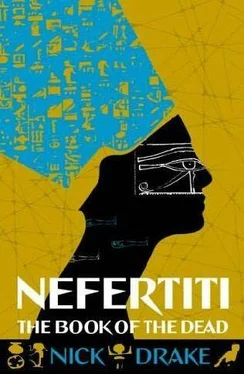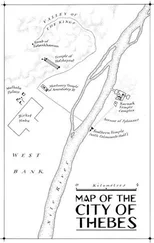Nick Drake - Nefertiti.he book of the dead
Здесь есть возможность читать онлайн «Nick Drake - Nefertiti.he book of the dead» весь текст электронной книги совершенно бесплатно (целиком полную версию без сокращений). В некоторых случаях можно слушать аудио, скачать через торрент в формате fb2 и присутствует краткое содержание. Жанр: Исторические приключения, на английском языке. Описание произведения, (предисловие) а так же отзывы посетителей доступны на портале библиотеки ЛибКат.
- Название:Nefertiti.he book of the dead
- Автор:
- Жанр:
- Год:неизвестен
- ISBN:нет данных
- Рейтинг книги:4 / 5. Голосов: 1
-
Избранное:Добавить в избранное
- Отзывы:
-
Ваша оценка:
- 80
- 1
- 2
- 3
- 4
- 5
Nefertiti.he book of the dead: краткое содержание, описание и аннотация
Предлагаем к чтению аннотацию, описание, краткое содержание или предисловие (зависит от того, что написал сам автор книги «Nefertiti.he book of the dead»). Если вы не нашли необходимую информацию о книге — напишите в комментариях, мы постараемся отыскать её.
Nefertiti.he book of the dead — читать онлайн бесплатно полную книгу (весь текст) целиком
Ниже представлен текст книги, разбитый по страницам. Система сохранения места последней прочитанной страницы, позволяет с удобством читать онлайн бесплатно книгу «Nefertiti.he book of the dead», без необходимости каждый раз заново искать на чём Вы остановились. Поставьте закладку, и сможете в любой момент перейти на страницу, на которой закончили чтение.
Интервал:
Закладка:
I was surprised at the absence on the streets of crowds, of bustle, of people with the usual variety of casual business. It seemed to be a place of single purpose. Its industry was the focus of its activities, in the service and celebration of Akhenaten and the royal family. All of which gave to the city a conscious and conspicuous strangeness, as if the confusion and colour of street life in Thebes had been reduced, calculated away almost; a place in which everyone was aware of the status and power of everyone else. It seemed less a city, more like a vast temple and palace complex with additions for the necessities of daily life. A beautiful place of enormous and overwhelming artifice.
But as we walked further into the city it began to seem less organized and complete than it had at first appeared. The newness of it all meant the courtyards' pylons and sacred buildings dazzled because they were whitewashed but in many places undecorated. The hieroglyphs on the walls were unfinished. Whole sections of the city centre were still under construction. Ugly scaffolding hid what will surely be offices and temple complexes. Thousands of workmen laboured at every level of the constructions. Wide pathways and processionals petered out into desert tracks, or lost themselves in stones and dust. In the suburbs to the north and the south I was puzzled to note fine villas set next to poor shacks. The first tombs and chapels raised on an empty, stony arena at the edge of the cultivation, near the workmen's village, suggested the city's necropolis. At the heart of it all lay the central city, with the temple complexes to Aten and the bureaucracies. The extensive nature of these headquarters – indeed they seem as massive and as dominating as the temples themselves – is a signal of the true nature of the city, and I have heard they contain the largest secret papyrus archive assembled anywhere. I am keen to inspect this palace of secrets, and carry with me a letter of introduction. The purpose of collecting so much information can only be power. Perhaps, for all its impressive appearance, this is a city predicated on making its people afraid.
The other overwhelming impression – and one is glad of this for the heat, even for me, is shocking – was of water, everywhere. Normally one steps from the coolness of the river into chaos and dust. Not so here. The very stones of the walkways and the walls seemed fresh and clean, shining almost as if they too were fed on water. Firstly one became aware of the sound of it, constantly running in secret, under your feet, just out of sight. Then of the greenery and freshness of the gardens, and of the new trees planted along the avenues: I saw figs, date palms, persea, carobs and pomegranates. It may be that in this impossible capital it is always the season of fruit.
I boldly plucked a fig as I passed a garden wall; the branch was hanging down before me. Looking as I did so over the wall and into the garden I saw a tiled pool, and a woman who looked up in surprise and annoyance as the branch from which I had stolen my fig brushed back into place. The water was as clear as glass, the pool tiled in complex patterns of blue and gold. Such is the work of wealth. I would have to labour ten years to build such a pleasure palace. She was nearly naked as well, her skin the colour of the gold running through the tiles and the water. Here it seems women have leisure to sit in the shade while their husbands, presumably officers or diplomats, work at the business of creating the new world.
As we moved on, in strange contrast, we passed herds of labourers struggling among the rickety supports that were placed, ramshackle, along the high walls of the buildings. It is a wonder to me that such inadequate scaffolding does not collapse on a daily basis. Great stacks of dry mud-bricks stood everywhere like miniature desert cities for populations of tiny citizens. And I noticed, hidden in some of the shadowy alleys, broken, collapsed figures, looking as though they had not stirred for some time, and might not do so again.
I was marched directly to the offices of the Medjay. New quarters. Marble and limestone cladding on the walls, fresh decorations, efficient, elegantly stylish furniture, crates of documents and who knows what unnecessary junk half-unpacked or still unopened. Is this how our power is to be accommodated now? Such a contrast with our own dark, dated and shabby offices in Thebes, and in all the other stations in the different nomes I have visited. We passed down corridor after corridor, past crowds of men going about their business, most casting brief curious glances at me, until finally we arrived at large and ornately gilded wooden doors inscribed with the insignia of power and surmounted by that new emblem of divine power the Aten sun disc, its many little hands reaching down to the adoring world.
A secretary sat to one side at a desk. Barely acknowledging me, this young officer then entered the Great Office, while I was left to stand. The guards shuffled a little, my guide looked embarrassed, and the seconds ticked by. We all listened to a bird singing in the courtyard. I cleared my throat, which had no discernible effect on anyone. The guards continued to stare at the doors. I began to feel more like a prisoner than an honoured fellow officer. Finally, the door scraped open again – the new wood has expanded in the frame; how absurd this affected display of power, and a door that sticks! – and the secretary bid me enter. I gave him a nod of the head, meant to be ironic, and walked forward into the next stage of the mystery. The doors closed behind me.
6
I found myself in a large, open, well-lit room. A great desk, its polished surface of some gorgeous hardwood unfamiliar to me, dominated. On it were a few objects of fine workmanship: a vase of blue lotus flowers, a statuette of Akhenaten, an alabaster decanter delicately formed in the shape of a bird rising from water, a collection of goblets, and two wooden trays. There was a strange panting sound coming from beneath the desk where a large man sat considering a document he had taken from the first tray. He ignored my presence. Mahu.
He was stocky, powerfully muscled, middle-aged. His seniority and power were evident in the manner and proportions of his body and the distinctively brutal, almost hewn shape of his head, with its strong grey hair cut close to the scalp; as well as in the elegant clothing of that body, which was rich and luxurious in every way. He wore an extraordinary collar. I had time to observe it. Six rows of rings carried a multitude of smaller gold rings strung on cords, held together by a heavy clasp decorated with a winged scarab and sun discs, and inlaid with lapis lazuli. He also wore a sleeved tunic of finest white linen and sandals.
But more interesting than all this theatrical regalia were his eyes. When he finally deigned to look up I saw that they were unusual, not in their topaz colouring, but in the way they shimmered with hunger. As cruel and apparently casual as a lion or a god. I felt he could gaze through to my very bones, to the weaknesses and vulnerabilities and destinies hidden within them. I wondered whether he ate breakfast; whether he had children, a wife, friends; whether his was a life in which such power can be harnessed to tenderness and care; or whether all humanity, all its dreams and ambitions and vanities of the heart, was so clear to him that he had no more feeling for it than a god has for the foolish mortals whom time wipes out in a moment, like a cloth across a speckled and misty mirror.
I returned his stare. He rose from the desk and moved towards me, accompanied by a slathering black dog – the source of the odd panting.
'I see you are interested in my collar,' he said. 'A gift from Akhenaten. It is important to dress as one believes oneself to be, don't you think?'
Читать дальшеИнтервал:
Закладка:
Похожие книги на «Nefertiti.he book of the dead»
Представляем Вашему вниманию похожие книги на «Nefertiti.he book of the dead» списком для выбора. Мы отобрали схожую по названию и смыслу литературу в надежде предоставить читателям больше вариантов отыскать новые, интересные, ещё непрочитанные произведения.
Обсуждение, отзывы о книге «Nefertiti.he book of the dead» и просто собственные мнения читателей. Оставьте ваши комментарии, напишите, что Вы думаете о произведении, его смысле или главных героях. Укажите что конкретно понравилось, а что нет, и почему Вы так считаете.











